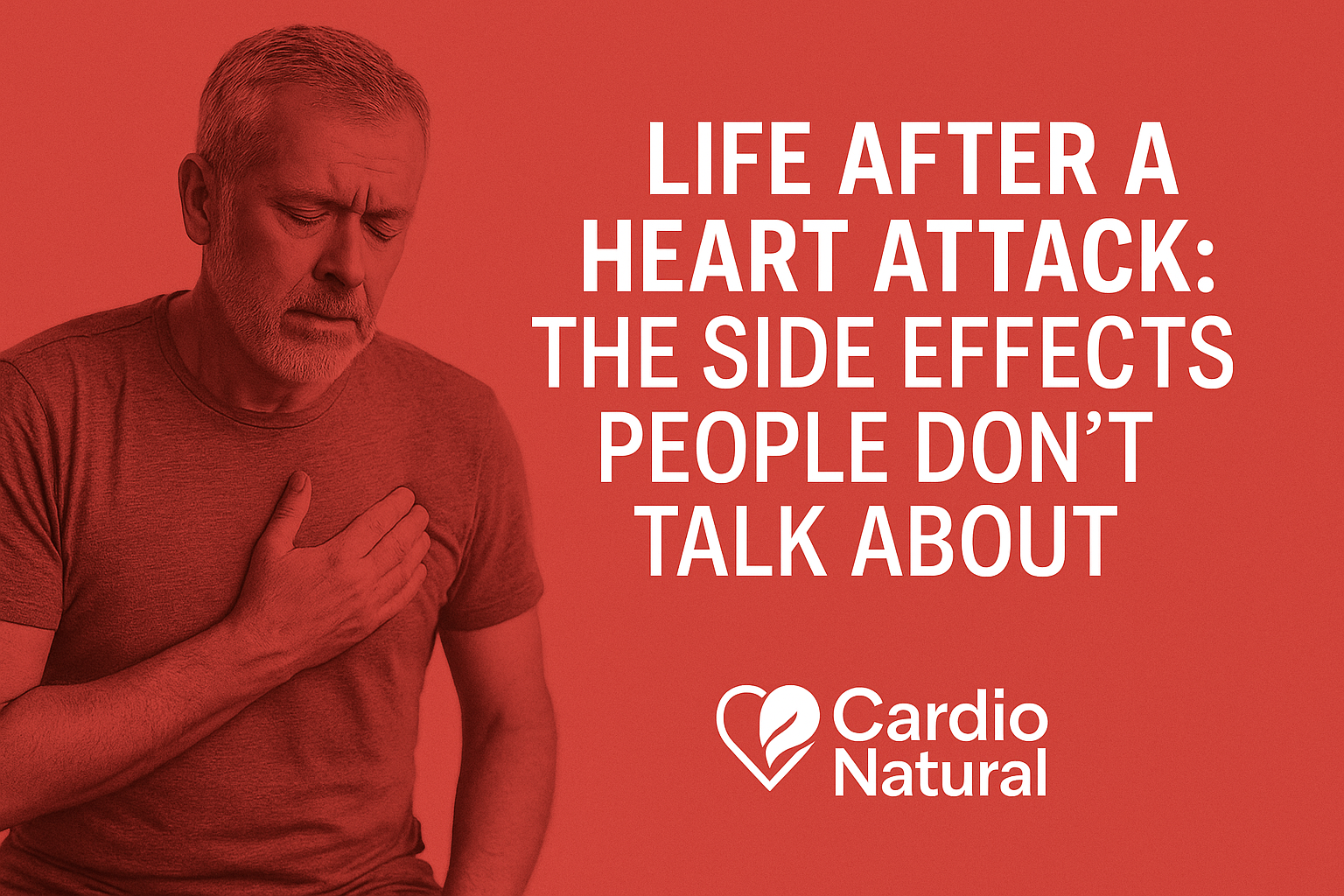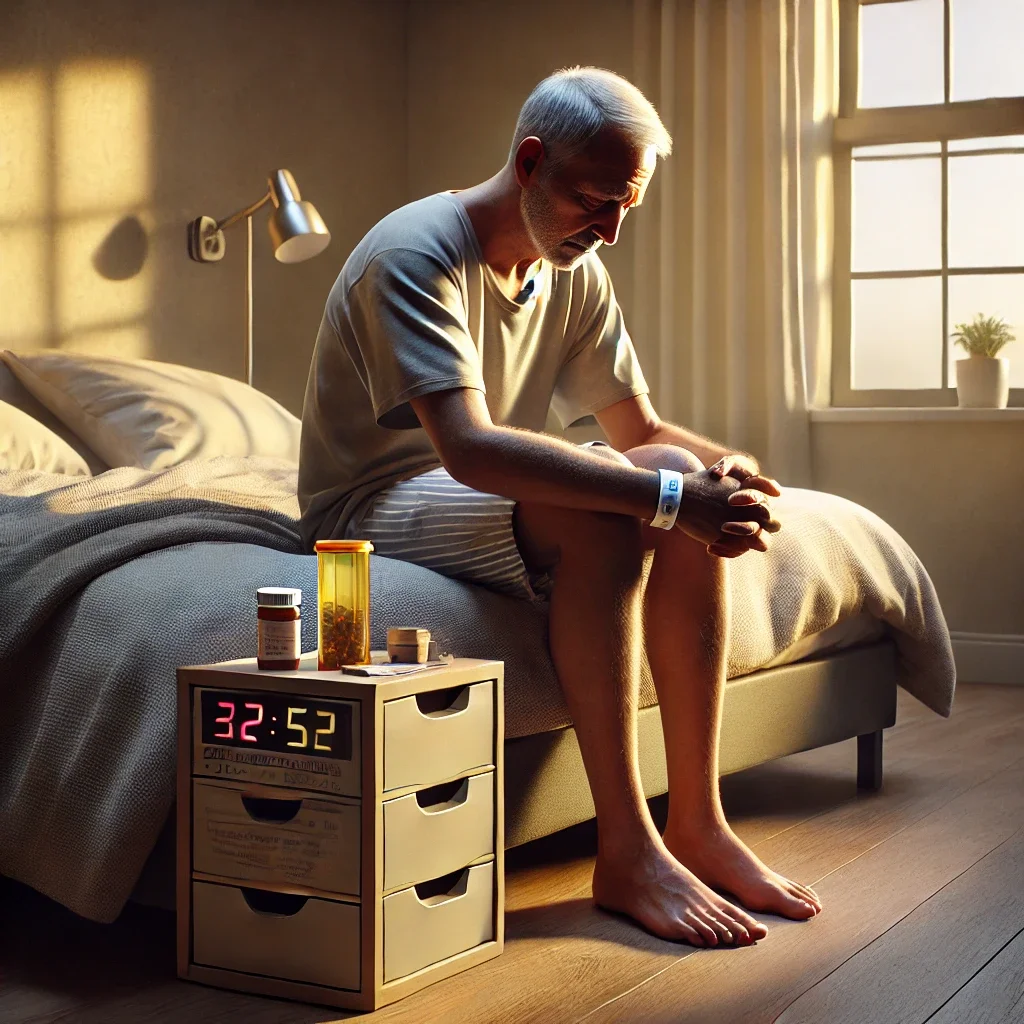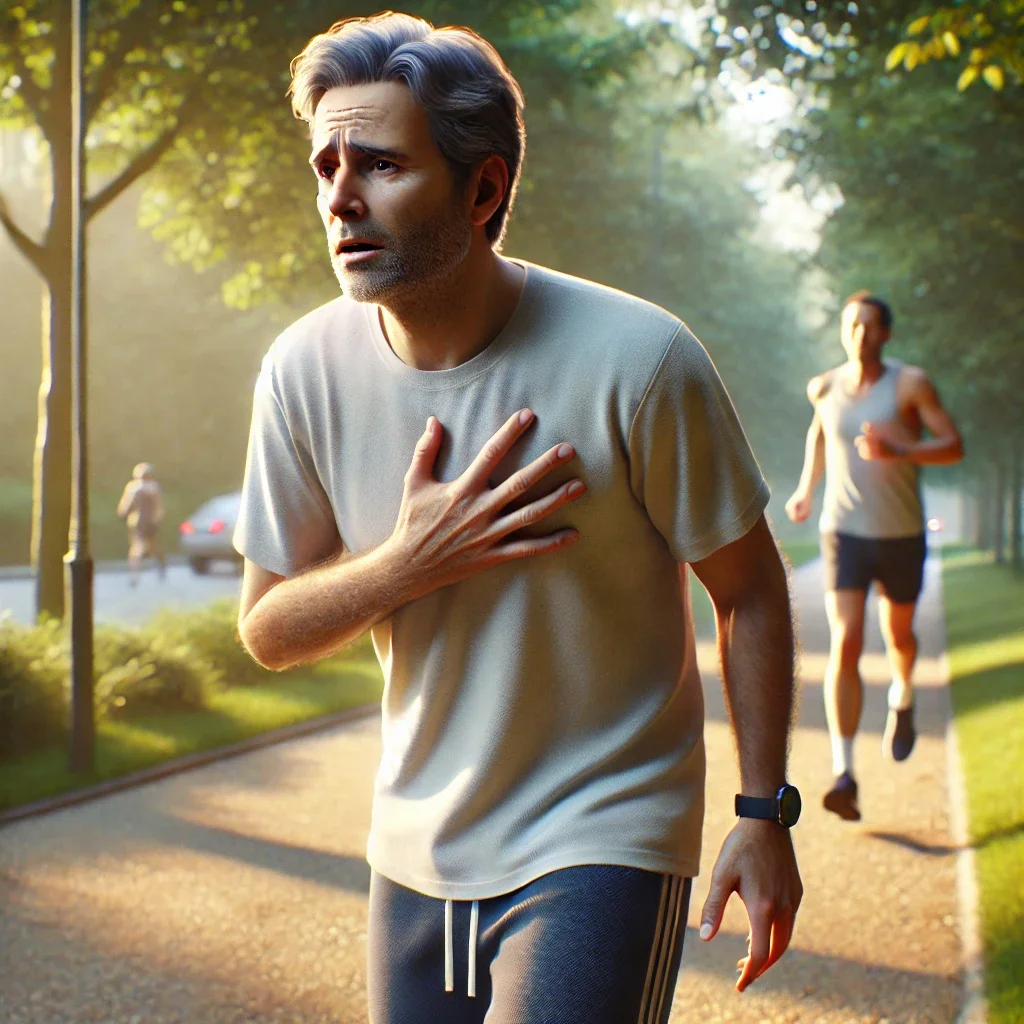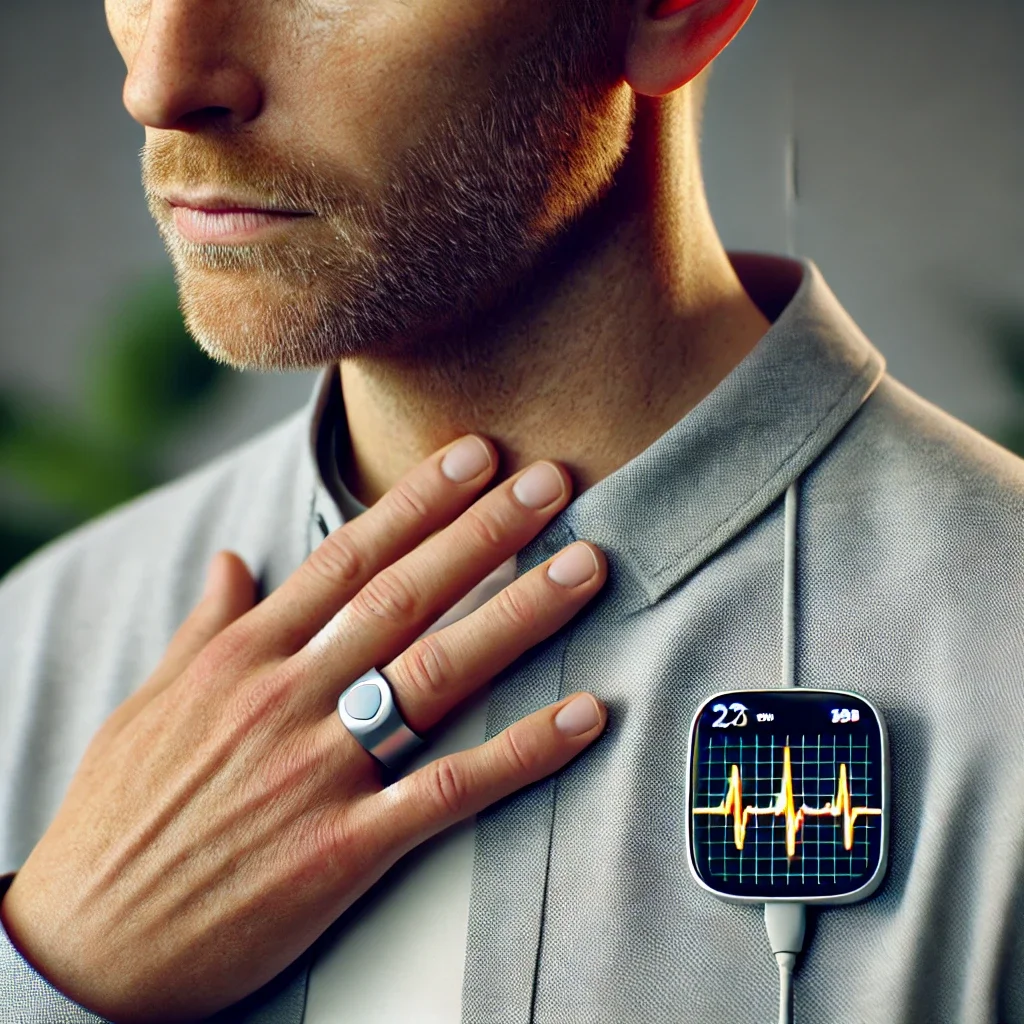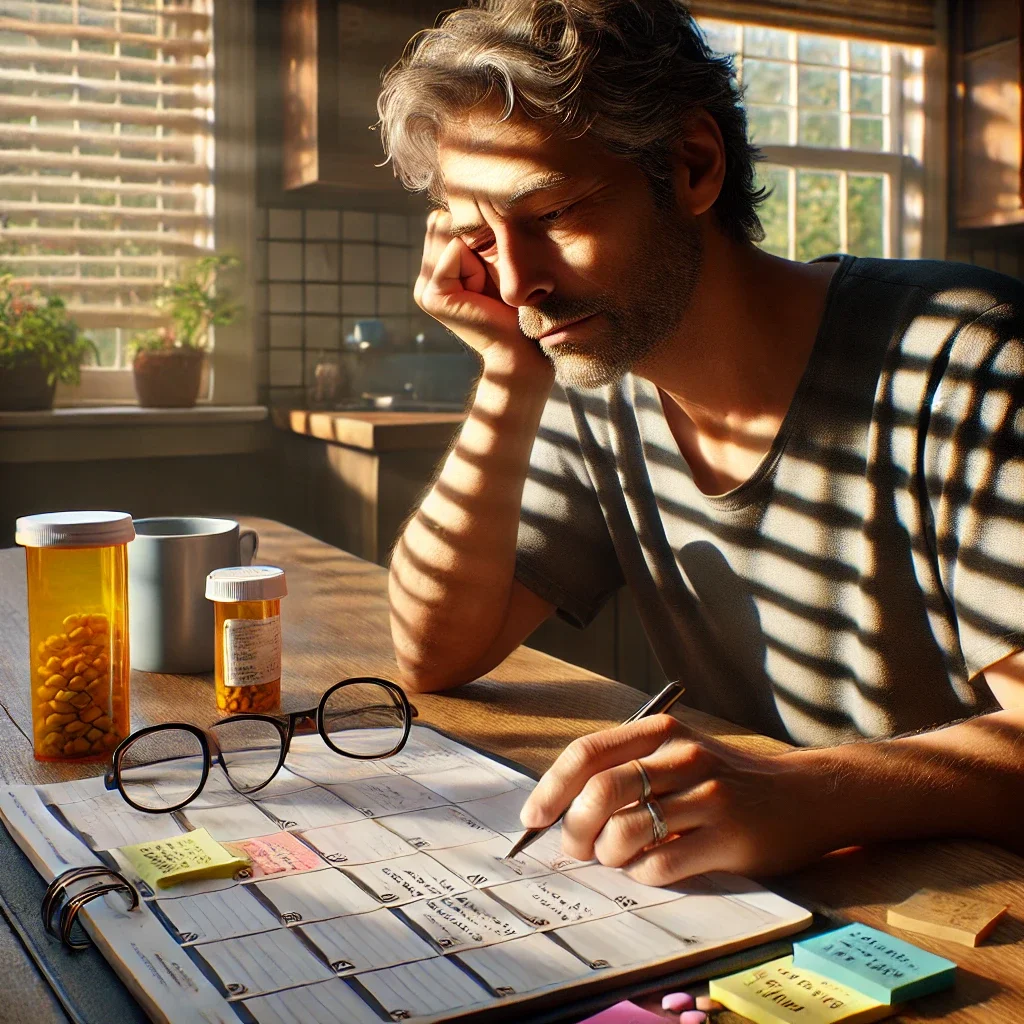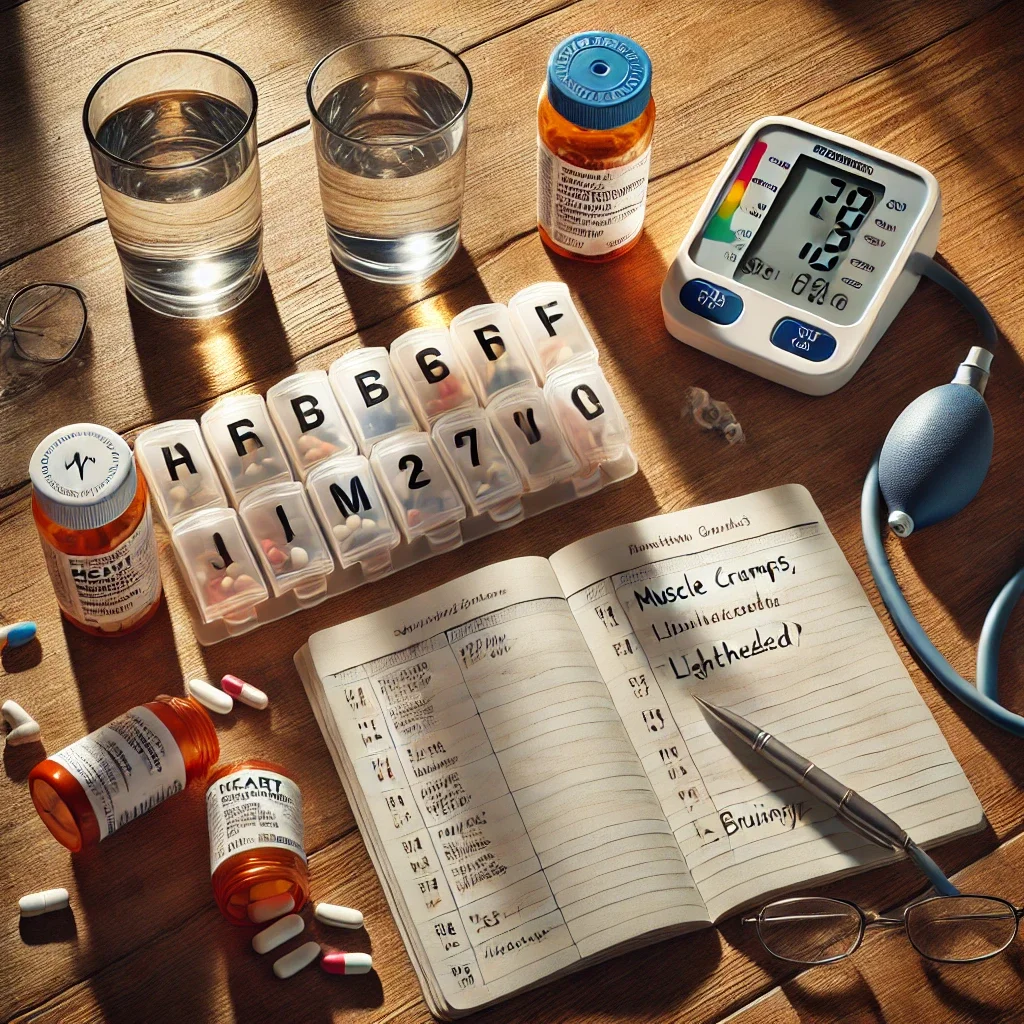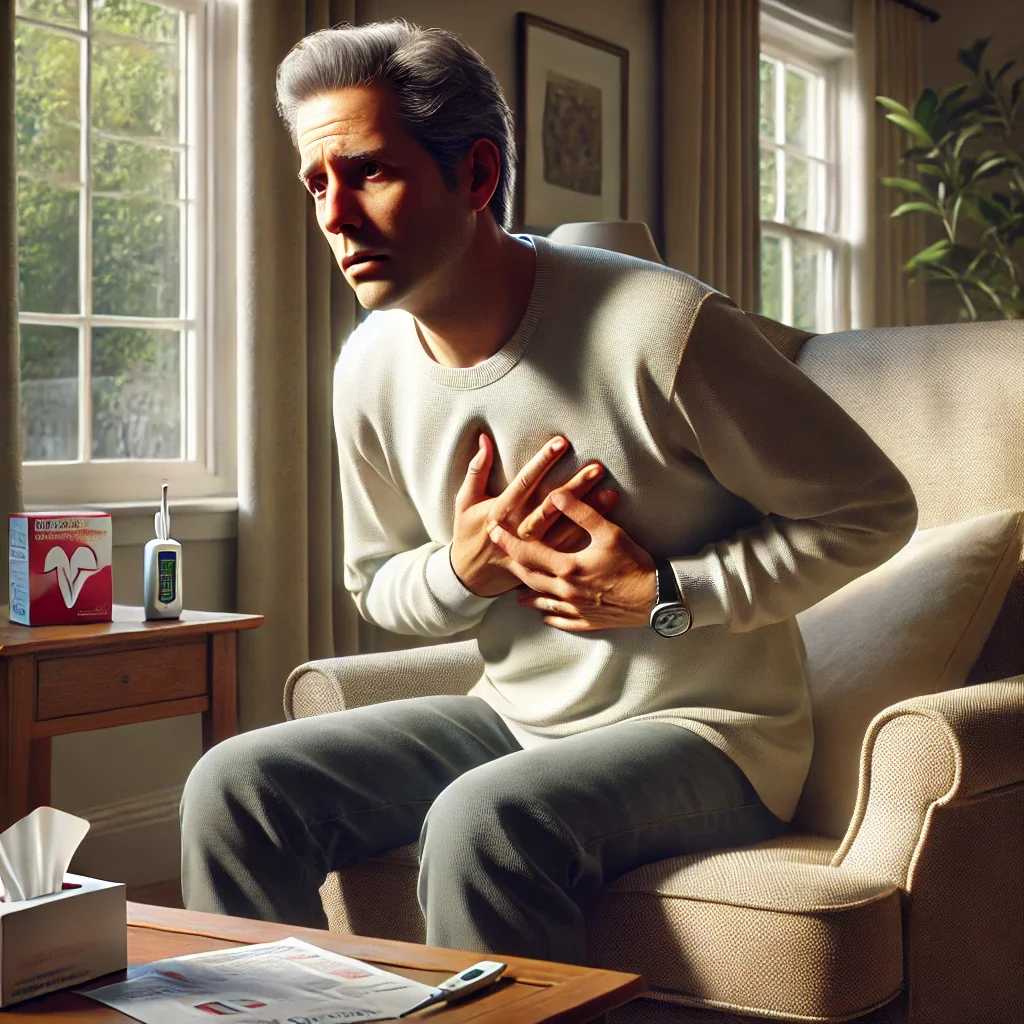Life After a Heart Attack: The Side Effects People Don’t Talk About (In-Depth Guide for Survivors)
Surviving a heart attack is life-changing. But for many people, the hardest part isn’t the hospital stay—it’s what comes after. Suddenly, you’re dealing with strange new sensations, unexpected fatigue, emotional ups and downs, and the worry of “Is this normal or a warning sign?”
This in-depth guide covers the most common side effects survivors ask about online—from fatigue and poor circulation to anxiety and sleep problems—plus what usually improves with time and what requires medical attention.
1. Fatigue: Why You Feel Drained
Why it happens:
Your heart muscle is healing, your body is adapting, and medications like beta-blockers may slow you down.
Story:
“Three weeks after my heart attack, I still felt like I was walking through mud. Even folding laundry made me want to lie down. I thought something was wrong—but my doctor reassured me that fatigue is one of the most common side effects.”
Why it happens:
Fatigue is the single most common post-MI complaint. The body needs extra energy for tissue healing, and the heart may not pump as efficiently as before. On top of this, hospital sleep disruption, new medications (like beta-blockers), low mood, and even fear of moving too much can amplify tiredness.
What’s common:
Feeling like daily tasks take more effort.
Needing naps or longer sleep than before.
A “heaviness” in your body, even when you haven’t done much.
What’s concerning:
Fatigue combined with shortness of breath, swelling, or rapid weight gain (may signal heart failure).
Sudden worsening fatigue unrelated to activity.
What helps:
Cardiac rehab (proven to restore stamina).
Gradually pacing activities—walk for 5–10 minutes, rest, repeat.
Regular bedtime and morning light exposure.
Ask about medication adjustments if fatigue is severe.
2. Shortness of Breath (SOB) & Exercise Intolerance
Why it happens:
Weakened pumping ability, fluid retention, or simple deconditioning.
Story:
“I noticed I could barely climb half the stairs before gasping. What scared me most was waking up at night out of breath. My nurse told me that’s a red flag for fluid buildup, and I needed an adjustment in my meds.”
Why it happens:
A heart attack may weaken the pumping muscle, leading to less oxygen delivery. Some SOB comes from deconditioning (being “out of shape”), but it can also signal fluid buildup or rhythm problems.
What’s common:
Breathlessness with exertion during early recovery.
Needing to slow down more often than before.
What’s concerning:
SOB at rest, or when lying flat.
Waking up suddenly at night gasping for air.
Rapid fluid weight gain or new leg swelling.
What helps:
Monitor weight daily.
Stick to low-sodium meals.
Rehab exercise to rebuild confidence.
Urgent call if SOB worsens suddenly.
3. Chest Sensations: Soreness vs. Angina
Story:
“My chest felt sore after the procedure—I figured it was from the stent. But when I felt crushing pressure during a walk, I panicked. Turns out, that was angina, and I needed a medication change.”
Why it happens:
The chest wall and catheter access site may be sore after procedures. Scar tissue also changes how the heart feels.
What’s common:
Mild soreness near incision or chest wall.
Occasional twinges during movement.
What’s concerning:
Pressure, squeezing, or burning that appears with exertion and eases with rest (classic angina).
Chest pain radiating to jaw, arm, or back.
Pain lasting >15 minutes, especially with nausea, sweating, or dizziness → call 911.
4. Palpitations & Irregular Heartbeats
Story:
“Out of nowhere, my heart would flutter for a few seconds. I thought it was anxiety, but my doctor put me on a monitor and found an irregular rhythm. Luckily, it was manageable with treatment.”
Why it happens:
A damaged area of the heart can disrupt electrical signals. Stress, caffeine, and dehydration can make palpitations worse.
What’s common:
Occasional skipped beats or brief fluttering.
Mild racing after exertion or anxiety.
What’s concerning:
Sustained rapid, irregular, or pounding heartbeat.
Palpitations plus fainting, severe SOB, or chest pain.
What helps:
Stay hydrated, limit caffeine.
Keep a log of episodes.
Ask about wearing a Holter monitor.
5. Swelling (Edema) & Fluid Retention
Story:
“My ankles looked like balloons, and my shoes didn’t fit by evening. I learned that fluid retention can creep up after a heart attack. Now, I weigh myself every morning to catch it early.”
Why it happens:
If the heart pumps less efficiently, fluid can pool in ankles, legs, or abdomen. Certain medications may also contribute.
What’s common:
Mild ankle swelling after standing long hours.
What’s concerning:
Swelling that worsens daily.
Shoes or pants suddenly tighter.
Quick weight gain (2–3 lb in 24 hrs, 5+ lb in a week).
What helps:
Daily weight check (same scale, same time).
Limit added salt.
Take diuretics exactly as prescribed.
6. Dizziness & Lightheadedness
Story:
“Every time I stood up, the room spun. I was afraid to leave the house. My doctor adjusted my beta-blocker dose, and the dizziness eased up.”
Why it happens:
Low blood pressure, rhythm changes, or side effects of medications (especially beta-blockers or ACE inhibitors) can trigger dizziness.
What’s common:
Brief dizziness when standing quickly.
Feeling “off balance” after activity.
What’s concerning:
Fainting (syncope).
Persistent dizziness with chest pain or irregular pulse.
What helps:
Rise slowly from sitting/lying.
Drink adequate water unless on fluid restriction.
Check blood pressure regularly at home.
7. Brain Fog, Memory, and Concentration
Story:
“I’d lose my train of thought mid-sentence and forgot appointments. I thought I was losing my mind, but my rehab nurse called it ‘cardiac brain fog.’ It got better over time.”
Why it happens:
Reduced blood flow during the heart attack, microvascular changes, medications, or simply post-ICU “brain fog” can all play a role. Anxiety and depression can worsen it.
What’s common:
Word-finding issues.
Forgetting minor tasks.
Slower mental processing.
What’s concerning:
Major memory loss or confusion.
Sudden changes (could signal stroke).
What helps:
Write things down.
Engage in puzzles or brain games.
Ensure good sleep and physical activity.
Talk to your doctor if it interferes with daily life.
8. Anxiety, Depression, & PTSD-Like Symptoms
Story:
“I couldn’t stop thinking, ‘What if it happens again?’ I avoided exercise, isolated myself, and sank into sadness. When I joined a support group, I realized I wasn’t the only one. Talking helped me move forward.”
Why it happens:
A heart attack is traumatic. Worry about recurrence, medication burden, and lifestyle change can overwhelm anyone.
What’s common:
Worrying about exertion or symptoms.
Sadness or loss of motivation.
What’s concerning:
Persistent sadness, hopelessness, or thoughts of self-harm.
Panic attacks that limit daily activity.
What helps:
Peer groups (like CardioConnect).
Counseling/therapy (CBT shown to help).
Safe medications for mood, if needed.
9. Sleep Problems & Sleep Apnea
Story:
“I tossed and turned for hours. My wife said I snored and stopped breathing at night. Testing confirmed sleep apnea, and CPAP made a huge difference in my energy.”
Why it happens:
Stress, hospital routines, and medications may disrupt sleep. Untreated sleep apnea (OSA) is also common and can worsen heart strain.
What’s common:
Trouble falling asleep.
Light or fragmented sleep.
What’s concerning:
Loud snoring, pauses in breathing, morning headaches.
Falling asleep during the day despite adequate hours.
What helps:
Screen for OSA if symptoms fit.
Consistent sleep schedule.
Avoid alcohol before bed.
10. Poor Circulation in Hands/Feet
Story:
“I noticed my toes turned purple in the cold. At first, I thought it was the weather, but my doctor said it could be poor circulation from PAD. Walking therapy and meds helped.”
Why it happens:
Beta-blockers sometimes reduce circulation to extremities.
Peripheral artery disease (PAD) can coexist with heart disease.
What’s common:
Cold hands/feet.
Tingling after long sitting.
What’s concerning:
Pain in calves when walking that improves with rest (claudication).
Non-healing sores on feet.
What helps:
Walking therapy.
Keep extremities warm.
Report severe or progressive symptoms to your doctor.
11. Sexual Health & Intimacy
Story:
“I was terrified to be intimate again, but my cardiologist said if I could climb two flights of stairs without symptoms, it was safe. Talking openly with my wife reduced the anxiety.”
Why it happens:
Fear of triggering another heart attack, medication side effects (like ED from beta-blockers), and fatigue all impact intimacy.
What’s common:
Anxiety about resuming sex.
Mild ED or vaginal dryness (in women).
What’s concerning:
ED linked to vascular disease (often treatable, but deserves medical review).
What helps:
Talk openly with partner and doctor.
Resume when you can climb 2 flights of stairs without symptoms.
Never combine ED meds with nitrates.
12. Medication Side Effects
Story:
“My cholesterol pill made my muscles ache so bad I thought I’d never walk right again. My doctor switched me to another statin, and the pain stopped. I didn’t realize side effects had solutions.”
Why they matter:
Heart attack survivors are usually prescribed multiple meds (antiplatelets, statins, ACE inhibitors, beta-blockers, diuretics). Side effects often overlap with symptoms of the disease itself.
Antiplatelets: bruising, bleeding risk.
Statins: muscle aches, rare but serious rhabdomyolysis.
ACE inhibitors: cough, dizziness, high potassium.
Beta-blockers: fatigue, cold extremities.
Diuretics: frequent urination, electrolyte imbalance.
Always report persistent or severe side effects—never stop a heart medication on your own.
13. Dressler’s Syndrome
Story:
“A month after my heart attack, I felt sharp pain that got worse lying down. I thought it was another heart attack. It turned out to be inflammation around my heart—Dressler’s syndrome—treated with meds.”
Why it happens:
A rare immune-related inflammation of the pericardium weeks after MI.
Signs:
Sharp chest pain, worse lying down, relieved when leaning forward.
Low fever, fatigue.
Needs medical attention—usually treated with anti-inflammatories.
What Helps Most (Backed by Evidence)
Enroll in Cardiac Rehab. It reduces symptoms, builds strength, and cuts future risk. Cleveland Clinic
Know your meds & take them as prescribed. Bring an updated list to every visit; ask about side effects you’re feeling. www.heart.org
Track key numbers: blood pressure, weight, symptoms (and what triggers them). Share patterns with your team. www.heart.org
Move daily, pace wisely. Gradual step goals + rest beats boom‑and‑bust cycles. Cleveland Clinic
Sleep like it matters. Address insomnia habits; screen for sleep apnea if you snore or feel unrefreshed. www.heart.org
Nourish your heart. A heart‑healthy dietary pattern (e.g., Mediterranean‑style, lower sodium) supports energy and fluid balance. (Discuss any supplements with your clinician to avoid interactions.) www.heart.org
Care for your mind. Ask for depression/anxiety screening; counseling and peer support (like CardioConnect) are powerful. PMC
Quit smoking/vaping and manage risk factors (BP, lipids, diabetes). Your team can help with proven tools. www.heart.org
Ask about sexual activity when you’re ready; it’s usually safe once you’re stable and symptom‑free with mild exertion. www.heart.org
Keep follow‑ups. Early months are when small adjustments prevent big setbacks. www.heart.org
When to Seek Immediate Help
New/worsening chest pain lasting >15 min.
Severe shortness of breath.
Fainting or irregular rapid heartbeat.
Signs of stroke (sudden weakness, speech trouble).
Black stools or vomiting blood (bleeding).
Call 911—don’t wait.
A quick word to family & friends
Recovery is a team sport. Offer rides to rehab, help with meals and sleep routines, and listen without judgment. If you notice confusion, worsening breathlessness, new swelling, or mood changes, encourage a check‑in with the care team. www.heart.org
When to Call 911 vs. Call Your Doctor
Call 911: Chest pain lasting >15 minutes, severe SOB, fainting, or stroke signs.
Call your doctor: Worsening swelling, new fatigue, mood changes, medication side effects.
Disclaimer:
The information provided in this blog post is for educational and informational purposes only and is not intended as medical advice. Always consult with your physician or qualified healthcare provider regarding any questions you may have about a medical condition, diagnosis, or treatment. Never disregard professional medical advice or delay seeking it because of something you have read here. Cardio Natural does not diagnose, treat, cure, or prevent any disease. Use of this site and its content is at your own risk.
Key Takeaways
Many post-heart attack symptoms are normal, but they deserve monitoring.
Recovery is not just physical—it’s emotional, cognitive, and social.
Rehab, lifestyle changes, and support groups like CardioConnect can make recovery smoother.
Don’t “tough it out”—share what you feel with your care team.
✅ Action Step for Readers: Join CardioConnect—a supportive community where survivors share experiences, tips, and encouragement. The first 100 members get free access.
Sources (patient‑friendly, reputable)
AHA: Life after a heart attack; emotional health; DAPT safety; heart failure signs; sleep apnea & heart disease. www.heart.org+4www.heart.org+4www.heart.org+4
Cleveland Clinic: Heart attack recovery; cardiac rehab; arrhythmias; heart failure symptoms; insomnia. Cleveland Clinic+4Cleveland Clinic+4Cleveland Clinic+4
Mayo Clinic: Heart attack emergency symptoms; chest pain; PAD; beta‑blocker & ACE‑inhibitor side effects; statin risks. Mayo Clinic+5Mayo Clinic+5Mayo Clinic+5
CDC: Peripheral artery disease overview. CDC
NHS & MedlinePlus: Recovery guidance; nitroglycerin & diuretic side effects. nhs.uk+1MedlinePlus
Peer‑reviewed/medical society: Depression after ACS; cognitive change after MI; OSA prevalence in heart disease. PMCJAMA NetworkJohns Hopkins MedicineAHA Journals

